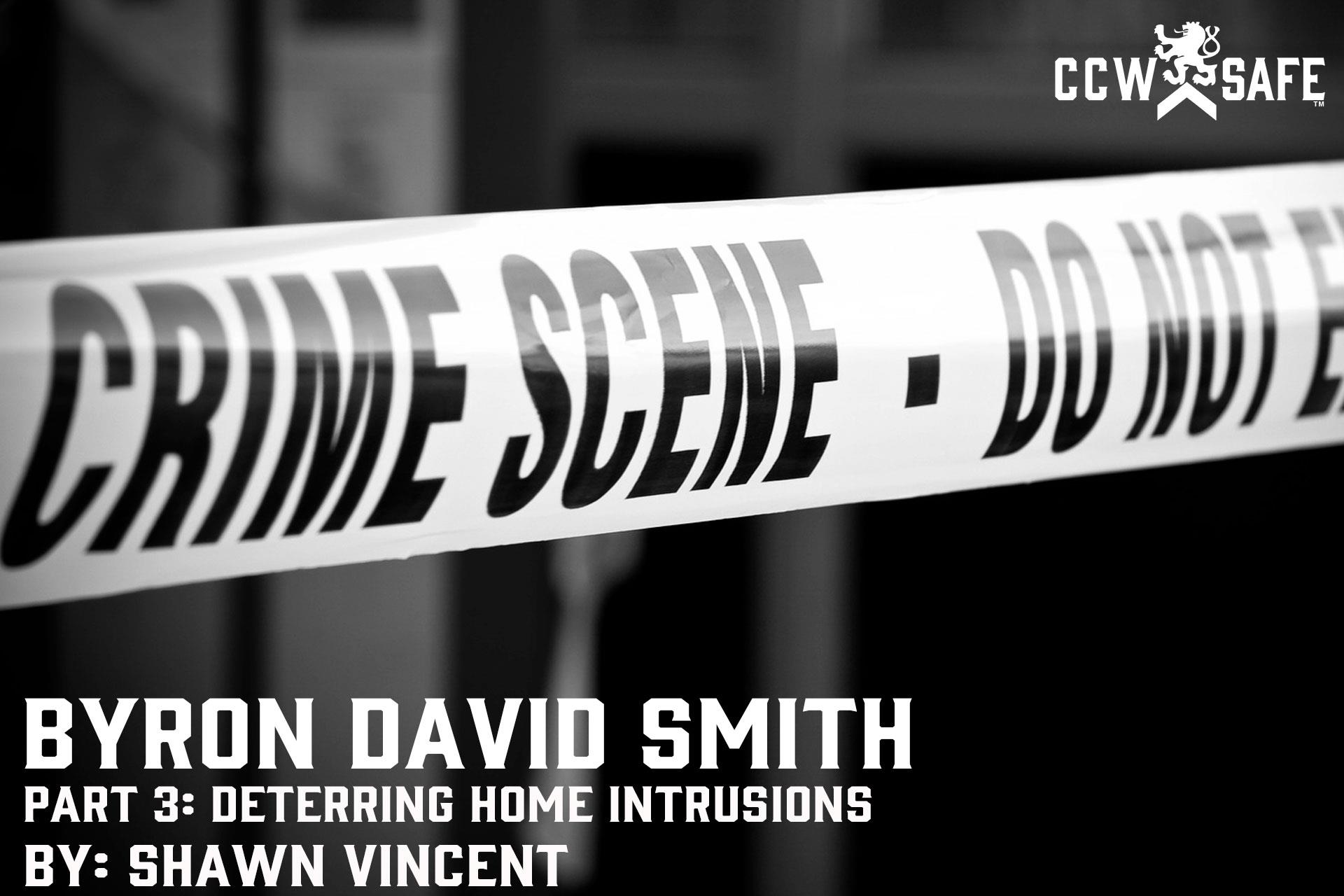
Posted on August 27, 2021
Byron David Smith Part 3: Deterring Home Intrusions
Byron David Smith
Part 3: Deterring Home Intrusions
Before he retired, Byron David Smith served as a “highly trained State Department security engineer responsible for protecting U.S. embassies from terrorism and espionage,” according to a report from MPR News Unfortunately, Smith proved less capable at protecting his own Little Falls, Minnesota home, which had been the target of several break-ins. The lone security device Smith employed was a four-camera surveillance system that alerted him to the presence of two teenagers lurking around his property on Thanksgiving Day 2012.
The cameras showed 17-year-old Nick Brady and 18-year-old Haile Kifer, cousins, walking around the exterior of Smith’s home, peeking into windows, looking to see if the house was occupied or vacant. Smith was at home, but he gave no indication that he was there. Instead, he retreated to his basement where at sat in a chair near the bottom of the stairway. There he waited, armed with a Mini-14 and a .22 revolver. A small audio recorder captured the events that followed.
Brady shatters a window in order to enter the house, and Smith sits silently as the teen wanderers through the home. When Brady begins to descend the staircase to the basement, Smith shoots him. The first words he speaks to the intruder are “You’re dead!” as he fires a fatal round into Brady’s face. Nearly 10 minutes later, Kifer enters the house, looking for her cousin. Again, Smith sits silently in his basement. From the top of the stairs, she softly calls out: “Nick!” There is no response. When Kifer begins to descend the steps, Smith shoots her, and she tumbles to the basement floor. “You’re dying. . . bitch!” Smith yells as he fires a fatal shot under her chin.
In a written pleading to the court, prosecutors accused Smith of “premeditating self-defense.” The term was used tongue-in-cheek, of course; there is no such thing as premeditated self-defense. They were accusing Smith of staging the circumstances so he could try to use a self-defense claim to get away with murder. Smith, the prosecutors argued, wanted to kill the teenagers. A jury agreed, and they convicted Smith of murder after a short three-hour deliberation.
One can debate whether Smith intentionally lured Brady and Kifer into his home with the intention of killing them, but it is difficult to argue that Smith made any sincere attempts to deter the teens from breaking in. Earlier in the day, Smith had moved his pickup truck down the street while he was working in his garage. Prosecutors said he moved his vehicle to make it look like he wasn’t home, and while Smith denied that was his intention, he recognized the effect it had.
When the surveillance system alerted Smith to the teens wandering around on his property, Smith made no effort to make it appear he was home. Had he switched on lights or turned on the television, it’s likely the teens would have seen the house was occupied, and they might have left. Smith could have yelled out the window for the teens to leave his property, and it’s likely they would have done so with haste. Instead, Smith said nothing and quietly went to his basement without so much as dialing 911.
When Brady broke a window to enter the home, it triggered no security detectors. No alarms sounded. For a man that was once in charge of engineering the security for U.S. foreign embassies, Smith’s home was surprisingly vulnerable to intrusion. Brady walked around for nearly two minutes with impunity. During this time, Smith could have yelled out, warning the intruder that if he didn’t leave immediately, he’d be shot. It’s likely that Brady would have fled. But that’s not what happened. Later, when Kifer was heard walking around the house, Smith could have warned her as well. When she softly called down their stairs for her cousin, Smith had an opportunity to declare his presence and his intention to fire if she came any closer. But that’s not what happened.
Firearms instructor Steve Moses encourages home defenders to give verbal warnings to intruders under certain circumstances. Steve says, “If you can get yourself into a secure, highly defensible position, I’m a big advocate of going ahead and letting them know: ‘I’m armed, I’ve called 911, and you need to leave now.’”
Steve acknowledges there is some risk inherent in issuing verbal warnings to suspected intruders. “There may be some sort of psychopath, and they don’t care, and all you’re doing is alerting them to exactly where you are, but one: you still have the tactical advantage if you’re set up in a proper defensive position, and two: the majority of persons who break into homes, just like the pair in this case, they have no intention of going in there and rushing to their death.”
Don West, criminal defense attorney and National Trial Counsel for CCW Safe, says there is a big difference between the profiles of a burglar and a home invader. A burglar enters a dwelling expecting and hoping that no one is home. While they may become violent if caught, they’re not there to commit a violent act. A home invader, by contrast, is likely entering a home to commit a robbery or kidnapping and violence is likely. The point of making this distinction is that armed home defenders are much more likely to encounter a burglar than a home invader, and a burglar is much more likely to retreat when detected if they have the opportunity to do so. If an intruder fails to be deterred by a verbal warning, the armed defender can be all the more assured the threat is real, and they can use deadly force with more confidence should the need arise.
When Byron David Smith was engineering security systems for U.S. embassies in Bangkok, Cairo, and Beijing, it’s unlikely his strategy was “hide in the basement and wait for the bad guys to break in.” In an interview with MPR News, retired U.S. State Department political officer William Davnie said, “Security engineers are focused on technical issues, such as building layout, wireless networks, locks, and alarms.” Had Smith used his professional training, he could have easily prevented the intrusion that led to the shootings of Brady and Kifer. As an armed home defender, there are things you can do to bolster the security of your home. You don’t have to be a State Department security engineer to install effective “locks and alarms.” Also, don’t forget about the effectiveness of verbal warnings for warding off non-violent intruders or disambiguating the intentions of bad guys who truly mean you harm.
 |
SHAWN VINCENT- LITIGATION CONSULTANTShawn Vincent is a litigation consultant who helps select juries in self-defense cases, and he manages public interest of high-profile legal matters. If you have any questions for Shawn, or would like more articles like this, let us know belo |